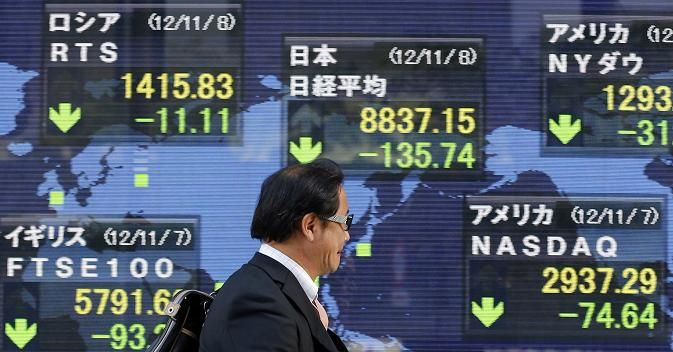Japan’s Economy May Already Be In Recession

Japan’s economy shrank in the third quarter for the first time since last year, and it will not be the last. The gloomy outlook forced Economics Minister Seiji Maehara to accept the possibility that the world’s No. 3 economy is already in a recession.
"I cannot deny the possibility that Japan has fallen into a recession phase," Maehara told reporters after the data were released Monday, according to Reuters. A recession is commonly defined as two consecutive quarters of contraction.
Gross domestic product contracted 0.9 percent in July-September, from the previous quarter, the Cabinet Office said. The fall in GDP translated into an annualized rate of decline of 3.5 percent, the biggest drop since Japan was hit by the disastrous March 2011 earthquake and tsunami.
The looming recession is piling pressure on Prime Minister Yoshihiko Noda ahead of an election that could be held before the end of this year.
“We think the possibility of recession will certainly increase the sense of crisis both among politicians and policymakers and we expect economic policies, both fiscal and monetary, to become more expansionary in coming quarters,” writes Masayuki Kichikawa, chief Japan economist at Bank of America Merrill Lynch in Tokyo.
Exports, private consumption and business investment, crucial components of the economy, recorded their steepest falls in multiple quarters.
External demand was the main drag. Weaker growth in the global economy and the spat with China over disputed islands, as well as the strong yen, caused exports to fall by 5 percent in the third quarter from the prior quarter, the biggest slide since a 6 percent decline in the second quarter of 2011.
Toyota Motor Corporation (TYO: 7203) and Nissan Motor Co., Ltd. (TYO: 7201) have reported huge sales declines in China amid anti-Japanese riots and attacks on Japanese businesses, including theirs.
Imports also fell, on weaker domestic consumer spending, but not by enough to offset the drop in exports. Consequently, net exports knocked 0.7 percentage points from third-quarter growth.
Weakening car sales following the end of the government’s auto subsidy for fuel-efficient vehicles was the biggest drag on consumer spending, which accounts for roughly 60 percent of the economy. Private consumption fell 0.5 percent in the third quarter.
Corporate capital spending tumbled 3.2 percent, the fastest pace of decline since a 5.5 percent drop in April-June 2009, as companies turned more pessimistic about earnings from domestic and overseas markets.
Public demand was the only component of GDP that rose on the quarter, underpinned by the reconstruction activities in the regions ruined by the disastrous earthquake, tsunami and nuclear meltdown.
The economic slump increases the prospects that the Bank of Japan will take additional measures to boost the economy, even after it eased policy in both September and October.
Facing two important elections within a year -- the general election for the Lower House could be called very soon and the Upper House election is scheduled to take place in July 2013 -- politicians, either of the ruling coalition or opposition parties, should be even more vocal in requesting economic stimulus measures from both fiscal and monetary policies, Kichikawa said. Policymakers both at the Ministry of Finance and the Bank of Japan should be very concerned that if the Japanese economy remains recessionary in the next year, it could jeopardize the consumption tax rate hike scheduled in April 2014.
“So we expect the economic policy, both fiscal and monetary, to become more expansionary in coming quarters,” Kichikawa said.
Kichikawa expects the central bank to ease its monetary policy further fairly soon -- in December or January -- and the government to put together another supplementary budget very early next year.
© Copyright IBTimes 2024. All rights reserved.






















